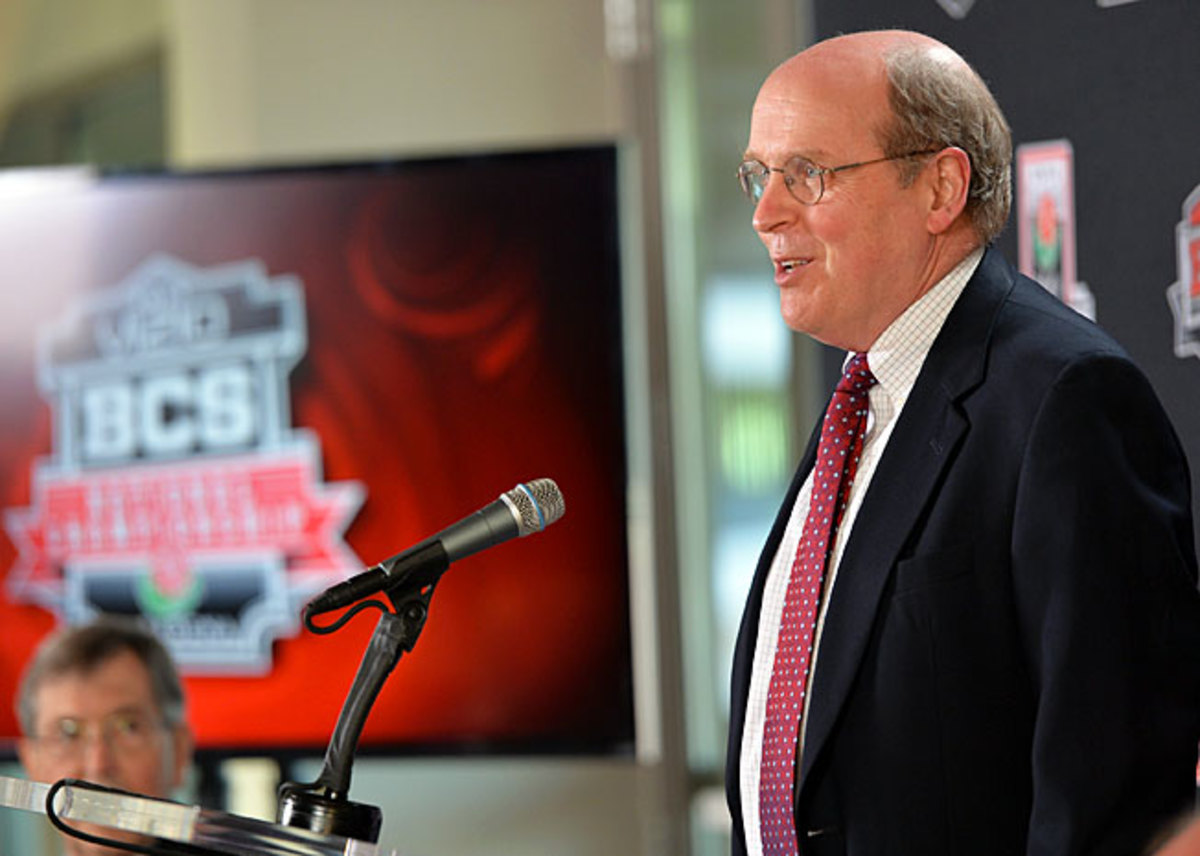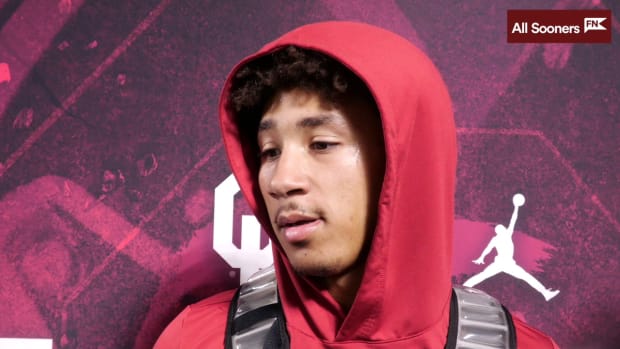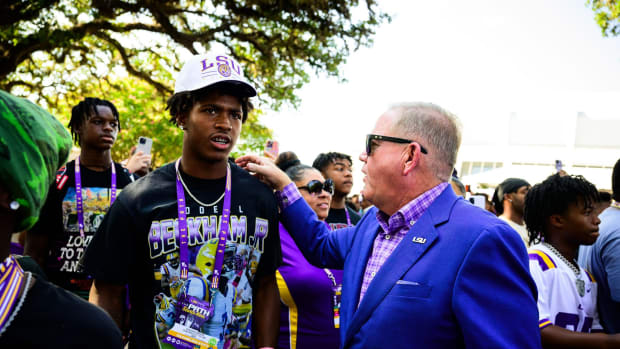Lack of selection committee headway clouds BCS meetings progress
PASADENA, Calif. -- At a Thursday media briefing at the conclusion of two and a half days of meetings, BCS/College Football Playoff executive director Bill Hancock was asked how much time the commissioners spent this week discussing the forthcoming playoff selection committee. Hancock thought about it for a few beats before replying, "probably two or three hours."
This after spending nearly 20 hours in meeting rooms.
The big news out of this week's meetings was the announcement of the new event's name, dates and sites, and certainly those logistical pieces needed to be resolved early. While the group wound up choosing the exact host bowls (Fiesta, Cotton and Chick-fil-A) and title site (Arlington) most were predicting as far back as last summer, it still had to do its due diligence. "We had a lot on our plates," said Hancock.
MANDEL: Breaking down the new College Football Playoff system
However, after conversations both public and private with those in the room and those with knowledge of the discussions, it's clear that the commissioners have made almost no headway on what is arguably the most important element of the entire spectacle. The logos, stadiums and television windows won't have nearly the same effect on public acceptance as the method by which the participants are chosen.
And yet, 10 months after proudly announcing the concept and espousing their various opinions about it, the commissioners have yet to reach an agreement on any specific aspects of the selection committee.
"It's much more difficult than we first thought," said Sun Belt commissioner Karl Benson.
They don't know what the size of the committee will be. The latest reported number was "14 to 20," but that's far from a guarantee. "I think there's honest disagreement in the room," Big 12 commissioner Bob Bowlsby said of the group's talks.
They don't know whether the committee members will be current administrators, ex-coaches and athletic directors, former media members or some combination of the above. They don't know whether the group will be divided geographically, by conference affiliation or something else. They don't know which sets of data the members will utilize, and they don't know whether the committee will issue an official poll late in the season, a la the BCS standings.
Not to toot our own horn, but one gets the impression SI.com devoted more energy to devising last fall's mock selection exercise than many commissioners have to shaping the real thing.
"The thing we had to decide as early as possible was the sites, as well as the name and that stuff," said Pac-12 commissioner Larry Scott. "The selection committee can take more time. They don't go to work until the fall of 2014."
As SEC commissioner Mike Slive said more than once on the subject: "We have time on our side." And for something this important, fans certainly wouldn't want them to rush the matter. "It's complicated," said Slive. "It requires a lot of thought. ... You've got to think about composition, numbers, people, criteria, process -- process. There's a lot to it."
Still, by all accounts, the group initially assumed it would be further along by now. At one point, the goal was to have a committee roster decided in time for the panel to use the 2013 season as a type of dress rehearsal. That doesn't seem to be the case anymore. "I don't sense any urgency on the part of commissioners to finish the framework and certainly the individual names before the fall," said Hancock.
So what exactly is the hold up?
Part of the problem is there's no precedent for the commissioners to follow. Their only model is the NCAA basketball committee, on which five of the 11 commissioners (Slive, Bowlsby, Benson, Jim Delany and Craig Thompson) have served. But picking the four best football teams based on a 12-13 game résumé is a far different -- and likely more difficult -- task than selecting 37 at-large teams each with 30-plus games of data. Likewise, the FCS playoff committee starts with 10 automatic qualifiers.
Meanwhile, though no one will come out and say it publicly, it appears the committee discussion has taken on an underlying turf war much like the original playoff debate last year. Remember the months of back-and-forth surrounding the conference champions vs. top-four teams question? The selection committee was the compromise that supposedly married the two sides. But the committee must still be charged with instructions, and the same people from last summer's debate who will ultimately write them.
Slive arguably has more at stake than anyone in the committee discussion. The BCS system has been highly favorable to the SEC, whose teams' repeated postseason triumphs have helped bolster their favorability with the pollsters who currently vote teams into the title game. A committee untethered from the traditional polls could be more discerning and possibly less forgiving of the now 14-team league's insistence on staying at eight conference games (the Big Ten will soon join the Big 12 and Pac-12 at nine) and feasting on Sun Belt and FCS foes.
Scott, who does not come from the basketball committee background, presumably wants his teams rewarded for their historically stronger nonconference schedules, but he's also less familiar with the associated metrics. Delany, whose league has inarguably fallen behind of late, has spoken out in the past about valuing a conference championship and perhaps not rewarding a team like 2011 Alabama that did not win its own division. Bowlsby must be on guard that his conference won't be penalized for its lack of a conference championship game.
Fans will want to know with absolute certainty that the committee is a wholly objective body that adheres to best practices. Teams and conferences should not be able to "game" the system.
"There's a lot right with the basketball process, and probably first among the characteristics is the integrity that comes with the process," said Bowlsby. "We certainly expect to replicate that."
Here's hoping that comes to fruition. The commissioners next convene in Colorado Springs, Colo., in mid-June. Surely, Hancock was asked, that meeting will be devoted exclusively to discussing the committee?
"No," he said.
Do they just find the matter too tedious?
"It's not nearly as tedious as the conversation to create the playoff," he said. "That was tedious. On this one, everybody agrees that the right thing needs to happen. They're being very deliberative about deciding what the right thing is."
Perhaps that's because the "right thing" could have a different effect depending on which side of the table one sits.






